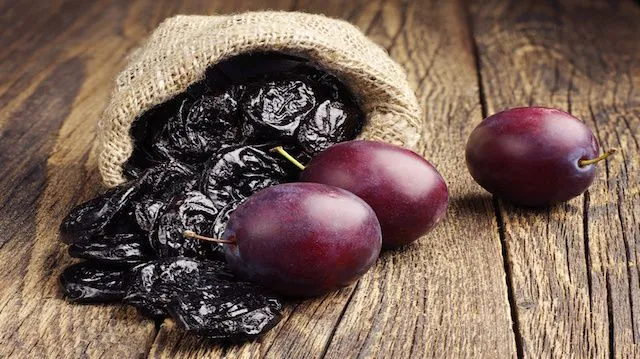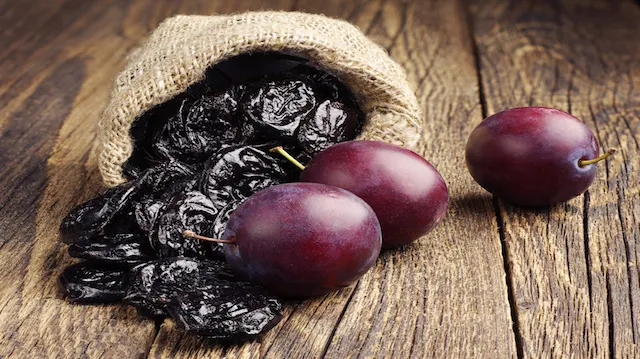
- Share on Facebook924
- Share on Pinterest
- Share on Twitter
Research presented at the 2015 Experimental Biology Conference in Boston, Massachusetts, has brought forward exceptional news in the fight against colon cancer. This research shows that consuming dried plums (prunes) may prevent you from getting colon cancer, also known as colorectal cancer. Colon cancer is one of the nation’s leading causes of death.
Research conducted by Dr. Nancy Turner, a professor and researcher in the Nutrition and Food Science Department at Texas A&M University, and colleagues found that dried plums evoke the retention of gut bacteria (microbiota) in the colon. Their findings suggest that gut bacteria in the colon has a positive effect, decreasing the risk of colon cancer.
The key focus of the research was on the intestinal inflammation that occurs when gut bacteria is disrupted — a disruption that has been associated with the development of colon cancer. Your gut microbiome, the wide variety of bacteria in your gut, plays a key role in your health. Immune function and metabolism are particularly affected, according to another recent study published in Current Opinion in Infectious Diseases (2015).
Alternative ways to keep you healthier and happier are what gets us excited at The Alternative Daily, so we’re thrilled to share the amazing health benefits of dried plums. Dried plums provide you with the vital vitamins and minerals you need. They also contain essential free radical fighting antioxidants like phenolic compounds, which are excellent for your overall health and wellness.
The health benefits of dried plums don’t end with colon cancer. Let’s take a closer look into the supercharged nutrition dried plums offer.
Obesity-fighting dietary fiber
Dried plums offer a wealth of fiber, which has been found to have multiple health benefits by researchers worldwide. Dried plums contain seven grams of dietary fiber per 100 grams, which is 28 percent your daily value (DV) of fiber. A study conducted at the Department of Internal Medicine and Nutritional Sciences Program, University of Kentucky, and published in Nutrition Reviews (2009), discusses the many health benefits of adding more fiber to your diet. One benefit is its significant association with weight loss in the obese, outlined in the University of Kentucky study.
Osteoporosis protection from vitamin K
Dried plums are loaded with vitamin K, an essential vitamin that prevents osteoporosis, atherosclerosis and even cancer according to various studies. A 100-gram serving of dried plums offers up 78 percent of your vitamin K daily value. These little powerhouses can help you prevent serious chronic disease associated with the natural aging process. Renowned vitamin K researcher Dr. Cees Vermeer, at VitaK and the Cardiovascular Research Institute Maastricht in the Netherlands discusses the vital health benefits of vitamin K. Vermeer’s research, published in Food & Nutrition Research (2012), states that vitamin K deficiency, “is a risk factor for osteoporosis, atherosclerosis, and cancer.”
Potassium rich for bone health
Potassium provides multiple health benefits, and dried plums deliver 21 percent of your DV per 100 grams. Multiple studies have found potassium to be vital for decreasing your risk of heart disease and cancer; however, potassium boasts bone health benefits as well. A study published in the Journal of Nutrition (2008) found that potassium-rich and bicarbonate-rich fruits and vegetables can increase your bone health significantly.
Vitamin anti-inflammatory
Dried plums contain a hearty serving of vitamin A. In a 100-gram serving of dried plums, your nutritional return of vitamin A is 16 percent of your DV. Vitamin A promotes eye health as it protects your cornea, boosts your immune system, and also has been found to “seek and destroy” dangerous cells in your body. Based on its anti-inflammatory properties, a recent study published in Nutrition (2015) concluded, “Vitamin A is therefore a potential therapeutic agent in inflammatory bowel disease.”
Nerve protection from vitamin B6
Vitamin B6, or pyridoxine, assists in the development of serotonin and norepinephrine, key neurotransmitters. Vitamin B6 is also an essential component of nerve cells. Consuming dried plums will help you get the vitamin B6 your body needs. You will receive 10 percent of your DV of vitamin B6 per 100 grams of dried plums. This will steer you clear of peripheral neuropathy, according to a study published in the Journal of Clinical Neuromuscular Disease (2014). The National Institutes of Health states that there are 79 million pre-diabetic Americans at risk for developing peripheral neuropathy, which causes severe aches and pains in your limbs, hands and feet.
Turn back the clock with manganese
Dried plums serve up 15 percent of your DV for manganese, an essential mineral for overall health. Manganese has been associated with bone health, maintaining healthy blood sugar levels, and also boasts antioxidant power that is vital to healthier skin. A study published in Dermato Endocrinology (2012), conducted at the Department of Dermatology and Allergic Diseases, University of Ulm, Germany, discusses the skin protective attributes manganese possesses. The research analyzed the effects of oxidative stress on the skin, aging and overall lifespan. Manganese may be an anti-aging mineral that will help you turn back the clock for your skin.
Protect against Alzheimer’s with copper
Studies have shown copper to decrease your risk for anemia, high cholesterol, arthritis, general fatigue and arrhythmias. For every 100 grams of dried plums you eat, you will get a 14 percent DV boost to your overall nutrition. Copper plays a vital role in your health and you should always strive to achieve the recommended levels. Copper deficiency is among the list of factors associated with Alzheimer’s disease. A study published in Frontiers in Physiology (2013) found that copper and cholesterol may have a key role in the development of Alzheimer’s. The study states, “Altered copper homeostasis and hypercholesterolemia have been identified independently as risk factors for Alzheimer’s disease (AD).”
Magnesium diabetes fighter
 Magnesium is a crucial mineral that you need for healthy metabolism. According to research, most Americans are magnesium deficient, only getting approximately 60 percent of their recommended DV. Dried plums can help you increase your magnesium intake, offering 10 percent of your DV per 100 grams. Maintaining a healthy level of magnesium will decrease your risk for diabetes, coronary heart disease, osteoporosis, hypertension, anxiety and depression. Those are all excellent reasons why you should put a bit more thought into how much magnesium you are consuming. A study published in the American Journal of Physiology Endocrinology and Metabolism (1995) found that magnesium supplementation significantly decreased the risk of diabetes in rats. This support in controlling blood sugar is vital, since almost 100 million Americans are diabetic or prediabetic, according to the Centers for Disease Control and Prevention (CDC).
Magnesium is a crucial mineral that you need for healthy metabolism. According to research, most Americans are magnesium deficient, only getting approximately 60 percent of their recommended DV. Dried plums can help you increase your magnesium intake, offering 10 percent of your DV per 100 grams. Maintaining a healthy level of magnesium will decrease your risk for diabetes, coronary heart disease, osteoporosis, hypertension, anxiety and depression. Those are all excellent reasons why you should put a bit more thought into how much magnesium you are consuming. A study published in the American Journal of Physiology Endocrinology and Metabolism (1995) found that magnesium supplementation significantly decreased the risk of diabetes in rats. This support in controlling blood sugar is vital, since almost 100 million Americans are diabetic or prediabetic, according to the Centers for Disease Control and Prevention (CDC).
Dried plums are anything but average when it comes to their amazing health benefits. They offer you a nutritional package to support your mental and physical health for the long term. One of the most useful characteristics of dried plums is that they are so easy to carry around. You can put a small container of dried plums on your desk at the office or on the counter at home, ready for snacking. You can kick candy to the curb, since dried plums are not only exceptionally good for you, but also sweet — just be careful not to eat too many. They make a great alternative trail snack, providing the calories you need to keep your energy levels up for that extra mile or two. Give dried plums a try on your next weekend outing and skip the sugary preservative-filled energy bars.
What other dried fruits do you have in your nutrition arsenal?
—The Alternative Daily
Sources:
http://nutritiondata.self.com/facts/fruits-and-fruit-juices/2043/2
http://experimentalbiology.org/2015/Program-Information/Society-Programs.aspx
http://www.cancer.org/research/infographicgallery/colon-cancer-early-detection-2014
http://www.ncbi.nlm.nih.gov/pubmed/26237547?dopt=Abstract
http://www.ncbi.nlm.nih.gov/pubmed/19335713
http://www.ncbi.nlm.nih.gov/pubmed/22489224
http://www.ncbi.nlm.nih.gov/pubmed/26429662
http://jn.nutrition.org/content/138/1/172S.abstract
http://www.ncbi.nlm.nih.gov/pubmed/25137514
http://www.ncbi.nlm.nih.gov/pmc/articles/PMC3583882
http://www.ncbi.nlm.nih.gov/pmc/articles/PMC3655288
http://ajpendo.physiology.org/content/269/4/E745.short
http://www.cdc.gov/diabetes/data/statistics/2014StatisticsReport.html
- Share on Facebook924
- Share on Pinterest
- Share on Twitter

